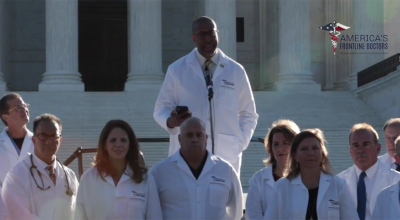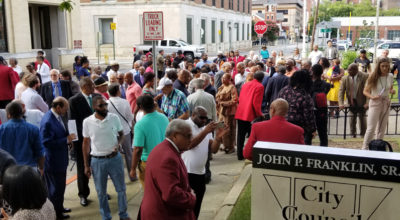

An investigative reporter today argued before chancery court in Chattanooga that Gov. Bill Lee’s CV-19 shut down of the Tennessee economy violates the state health law and must be deflated immediately.
By Staff Report / NoogaRadio 92.7 FM
The hearing is before Robin Miller, clerk and master, who insists more than once that she is there simply as clerk, administratively, and has no judicial authority to do anything with his Oct. 2 peremptory/emergency grievance.

chancery judge
However, Tulis notes that clerks and masters are vested with judicial authority of the chancellor, Pam Fleenor serving Hamilton County. The meeting takes place not in an office, but in a courtroom, with Mrs. Miller adorned in the second part of the hearing in a judicial robe. Tulis tells her she has authority to sign the decree, though she declaims more than once that authority.
The 10 a.m. encounter had been set up as a case management meeting over Tulis’ demands for an immediate ex parte ruling based on the record and exhibits in his 34-page affidavit of complaint.
Mrs. Miller insists the event is a meeting, not a hearing. But she converts it into a hearing, especially after in the middle of it she leaves and returns via the judge’s door wearing a black judge robe, saying that she could not have a meeting in a courtroom without them. A court officer, Kelly Burnette, barks, “All rise,” when Mrs. Miller returns from a visit with Judge Fleenor halfway through the 30-minute encounter.
Demands urgent decree
The chancery court thus far has rejected its ministerial duty to issue mandamus, and it has no duty to give leave to the malefactors to try to explain away their violations of the law. Chancery’s judge Fleenor, in refusing to rule for state of Tennessee and its people, is showing partiality for the governor and Mrs. Barnes, in violation of the state’s rules of judicial conduct.
Tulis makes his case for an immediate decree under mandamus to end the state of emergency under the pretended threat of a condition called Covid-19. The governor has rejected and ignored the health statute at Tenn. Code Ann. § Title 68-5-104, he says, that requires a determination of the agent of contagion and other steps that no one in state of Tennessee has done.
Tulis takes to the podium, with eyewitness Alan Guice of community bail fund at his side taking notes.
“Is this court administration exacerbating the wrongs alleged in the complaint and denying equity?” he demands. “Denying equity? How so? By delay.”
Tulis says his complaint was filed 28 days ago and proceeds to turn his grievance against case management into a chance to encourage Mrs. Miller and Judge Pamela Fleenor.
“The complaint of the people of Tennessee empowers this great and high jurisdiction to order the governor to onbey the law, and to end 232 days of violation of the law and an overturning and abrogation of the constitution. This complaint empowers this great chancery court of equity to issue a decree immediately and deliver the people of Tennessee and the state of Tennessee from the worst disaster in its 81,965 days since its founding in 1796, and that this complaint enables her to be a great judge.”
Tulis insists that delay is akin to “obstructing, impeding, hindering, and defeating the due course of justice, bringing irreparable continuing damage to the people.” He says the people have a right to equal protection of their rights in property and that he is securing the public interest by demanding a decree that the governor must obey the law.
Tulis objects to the fact the meeting today is two days after it was arranged Wednesday when he visited the clerk and master’s office demanding to have a decree on the spot on his mandamus.
‘Obstruction of justice’ in chancery
That a meeting was proposed two days later to discuss a peremptory writ that calls at law and at equity for immediate action indicates chancery administration is willing to accept injustice and inequity against the state itself and her people on the part of respondents for another two days. Two days delay, he says, is “obstruction of justice,” “given the irreparable harm, the state of disaster and the imperative nature of the petition for writ of mandamus,” he says.
Tulis, wearing a green suit and a signature bow tie, points out that 17 days after he filed his complaint in chancery, he filed a motion pro confesso, an unusual pleading that says effectively the court needs no further information or a hearing to rule — not even a reply from from respondents Lee and Barnes, who have not said a word yet about anything. These two need not reply on the record, because their record is already well established in executive orders and other exhibits Tulis filed. Their confession, in other words, is already made, and it is a nullity, without equity, before the court of equity.
That he felt the need to file a such a motion suggests he believes the court is dragging its feet. It has rejected a duty under the imperative emergency demands of mandamus.
“Equity demands that mandamus mandamus be given priority over any other item on the docket and that the chancellor has a clear, present official duty to rule on His complaint immediately for immediate disposition.”
He says that, based on conversation Wednesday with court attorney Rachel Kapperman, the court doesn’t know much about mandamus. Is mandamus akin to a temporary restraining order — she doesn’t know much about them?
Will wreckage to the people continue?
Tulis insists “equity cannot tolerate administration’s not knowing the difference between a mandamus and a TRO.” He described the nature of his petition to end the CV-19 disaster response as “peremptory. That means it is imperative, it is absolute, it is conclusive positive, not admitting question, delay, reconsideration; it is final and decisive and not admitting of alternatives,” he says, quoting Black’s Law Dictionary, 4th edition.
Gov. Lee and Becky Barnes have rejected their roles as trustee in a breach of their oath their duty and their fiduciary responsibility and, “and will the court administration do the same?”
He is demanding that the court act ministerially in the public interest and that delay is the same as destroying equity and destroying the court and the court’s remedy.
“No known authority allows delay like this to be considered just,” he says, “that no known authority approves of a continuing fraud a single day more under the bright light of the statute which is public notice and a public knowledge at 68-5-104 as well as the respondents’ awareness of their misdeeds through continuing notice by me in my inquiries” as investigative reporter for 92.7 FM and movant and relator in the action.
Tulis says he satisfactorily elevated the court in his analysis, esteemed it and did not come across as a critic or naysayer. Chancery has “an amazing and great power” and he opens his copy of Gibson’s Suits in Chancery and reads a maxim, “Equity will not suffer a right to be without a remedy” and that this is “the original source of the entire equitable jurisdiction of the chancery court.”
Tulis says Mrs. Miller holds administrative office and insists she can act under judicial investiture to do a duty, ministerially pursuant TCA § 29-25-102, mandamus, to “command [the official] to do the act.” He says that if there is any question about mandamus, American Jurisprudence, the legal encyclopedia, has 438 pages of detail about mandamus.
State has right to Fleenor doing her duty
Because mandamus is peremptory and emergency, the concept of ministerial duty applies. If it’s ministerial, there is no discretion, and there is no debate or argument. Gov. Lee is in flagrant violation of the statute in a criminal act, and there’s no debate required for a judge to order him to obey the law.
Tennessee state and people have “a specific legal right to the duty required to be performed,” he says, and his demand is specific, well-defined, nondiscretionary, complete, vested and without reasonable controversy.
He asked at least twice, “what can I do to help? I’m here to help this court bring about justice and equity. What can I do to help? Please what can I do?”
He demands several times a decree be signed, and that it is not a big deal, as all he is asking that the governor be directed to obey the law. How hard is that?
Administration and the court do not have discretion in the case management and that state of Tennessee ex rel Tulis must be at the top because it is a matter of “urgent matter of substantial justice.”
He said the court is a trustee of the public interest and must act by law, under law, and bring relief immediately to the people in this case.
Mrs. Miller indicates that Judge Fleenor will do nothing apart from the entry into the record of the U.S. postal service greenie (return certificate postcard with recipient signature). Tulis insisted he certified service to Gov. Lee because of a USPS website confirmation and a signature photostat provided him by the East Ridge post office manager. The greenie, indeed, is absent, but he says that failure by the post office cannot be basis of denial of equity in a statewide emergency.
Report live from radio station
https://www.facebook.com/noogaradio/videos/1589741684541245

Degringolade

